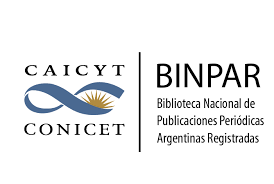El contacto con la naturaleza y el estado afectivo positivo en adultos teletrabajadores residentes en Buenos Aires
Contact with Nature and positive affective state in teleworking adults residing In Buenos Aires
Palabras clave:
contacto con la naturaleza, bienestar, afecto positivo, afecto negativoResumen
Se ha descrito en la literatura que estar en contacto con la naturaleza impacta de manera positiva en la salud mental y emocional de las personas, lo cual está asociado a niveles altos de bienestar. El presente estudio tuvo por objetivo analizar qué relación existe entre el contacto con la naturaleza y el estado afectivo positivo en adultos teletrabajadores residentes en Buenos Aires, Argentina. Para ello, se comparó el estado afectivo de adultos teletrabajadores residentes en Buenos Aires, según si mantenían un elevado o bajo nivel de contacto con la naturaleza. Se utilizaron los siguientes instrumentos: Escala de Contacto con la Naturaleza (ECN) y Escala de Afecto Positivo y Negativo (PANAS). Los resultados obtenidos muestran una correlación positiva entre el contacto con la naturaleza y el estado afectivo positivo en adultos teletrabajadores residentes en Buenos Aires.Citas
Beckel, J. L. O., & Fisher, G. G. (2022). Telework and Worker Health and Well-Being: A Review and Recommendations for Research and Practice. International Journal Of Environmental Research And Public Health, 19(7), 3879. https://doi.org/10.3390/ijerph19073879
Capaldi, C. A., Dopko, R. L., & Zelenski, J. M. (2014). The relationship between nature connectedness and happiness: a meta-analysis. Frontiers in Psychology, 5, 976. https://doi.org/10.3389/fpsyg.2014.00976
De Asís Martínez Manchón, F., González, P. V., Rodríguez, M. M., & Šimunić, A. (2023). La Escala del Contacto con la Naturaleza (ECN): Una herramienta para medir el contacto directo con el medio natural.Revista de educación ambiental y sostenibilidad, 5(2).https://doi.org/10.25267/rev_educ_ambient_sostenibilidad.2022.v5. i2.2102
Desrochers, J. E., Bell, A. L., Nisbet, E. K., &Zelenski, J. M. (2022). Does spending time in nature help students cope with the COVID-19 pandemic? Sustainability, 14(4), 2401. https://doi.org/10.3390/su14042401
Descola, P. (2005). Par-delà la nature et culture. Gallimard.
Gargurevich, R., (2010). Propiedades psicométricas de la versión internacional de la Escala de Afecto Positivo y Negativo-forma corta (I- Spanas SF) en estudiantes universitarios. Persona, (13), 31-42.
López‐Gómez, I., Hervás, G., & Vázquez, C. (2015). Adaptación de las «Escalas de afecto positivo y negativo» (PANAS) en una muestra general española. BehavioralPsychology-PsicologíaConductual, 23(3), 529-548. https://dialnet.unirioja.es/servlet/articulo?codigo=5283481
Mann, S., &Holdsworth, L. (2003). The psychological impact of teleworking: stress, emotions and health. New Technology, Work And Employment, 18(3), 196-211. https://doi.org/10.1111/1468-005x.00121
Pasca, L. (2018). Naturaleza, Conectividad y Bienestar. Universidad Complutense de Madrid.
Pasca, L., &Aragonés, J.I. (2021). Contacto con la Naturaleza: Favoreciendo la Conectividad con la Naturaleza y el Bienestar. Rev. CES Psico, 14(1), 100-111.
Stieger, S., Aichinger, I., &Swami, V. (2020). The impact of nature exposure on body image and happiness: an experience sampling study. International Journal Of Environmental Health Research, 32(4), 870-884.https://doi.org/10.1080/09603123.2020.1803805
Vert, C., Gascon, M., Ranzani, O., Márquez, S., Triguero-Mas, M., Carrasco Turigas, G., Arjona, L., Koch, S., Llopis, M., Donaire-Gonzalez, D., Elliott, L.R. &Nieuwenhuijsen, M. (2020). Physical and mental health effects of repeated short walks in a blue space environment: a randomised crossover study, Environmental Research, (188), 109812.https://doi.org/10.1016/j.envres.2020.109812
Watson, D., Clark, L. A., &Tellegen, A. (1988). Development and validation of brief measures of positive and negative affect: The PANAS scales. Journal Of Personality And Social Psychology, 54(6), 1063-1070.https://doi.org/10.1037/0022-3514.54.6.1063
White, M. P., Alcock, I., Grellier, J., Wheeler, B. W., Hartig, T., Warber, S., Bone, A., Depledge, M. H., & Fleming, L. E. (2019). Spending at least 120 minutes a week in nature is associated with good health and wellbeing. Scientific Reports, 9(1), 7730. https://doi.org/10.1038/s41598-019-44097-3
White, M. P., Elliott, L. R., Grellier, J., Economou, T., Bell, S., Bratman, G. N., Cirach, M., Gascón, M., Lima, M. L., Lõhmus, M., Nieuwenhuijsen, M., Ojala, A., Roiko, A., Schultz, P. W., Van Den Bosch, M., & Fleming, L. E. (2021). Associations between green/blue spaces and mental health across 18 countries. ScientificReports, 11(1), 1-12. https://doi.org/10.1038/s41598-021-87675-0
Descargas
Publicado
Cómo citar
Número
Sección
Licencia
CREATIVE COMMONS 4.0 Internacional
Los trabajos publicados en esta revista están bajo Licencia Creative Commons Atribución-NoComercial-CompartirIgual 4.0 Internacional.
Las obras publicadas bajo esta licencia pueden ser compartidas, copiadas y redistribuidas en cualquier medio o formato. Asimismo, se autoriza la adaptación, remezcla, transformación y creación. Tanto el compartir como el adaptar son posibles siempre y cuando se le otorgue el crédito a la obra de forma adecuada, proporcionando un enlace a la licencia e indicando si se han realizado cambios. Asimismo, no es posible realizar un uso comercial del material.






